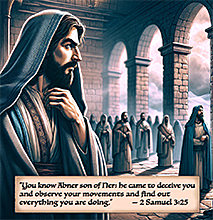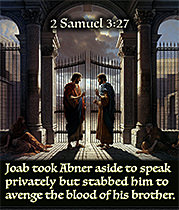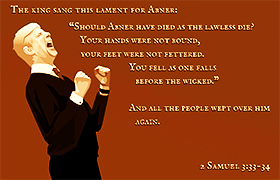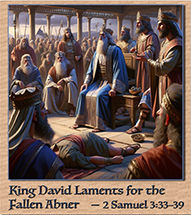2 Samuel 3:22–39 . . . Bible Study Summary with Videos and Questions
“Joab Murders Abner”
Looking back, David has been plainly absent in 2:12 to 3:11. His name may be mentioned, but he’s not one of the central characters in this drama, such as Abner, commander of Israel’s armies, and Joab, one of David’s men and one of the commanders of Judah’s military force. Both men agreed upon the “contest” (for contest details, see Week 34’s summary), which not only got twenty-four contestants killed, but brought on open war between the people of Judah and the people of Israel. All appearances are that it was a senseless contest, a projection of the ego-centered competition between Abner and Joab. [Their] war dragged on, undermining Israel’s unity, causing needless suffering and death, leading to the murder of Abner, by Joab, which we’ll focus on in today’s summary.
[Note: Click the link to This Week’s Passage near the bottom of this page to read today’s Scripture.]
Joab, David’s General, Believes Abner to Be a Spy (2 Samuel 3:22–25)
22Just then, David’s men and Joab returned from a raid and brought with them a great deal of plunder. But Abner was no longer with David in Hebron, because David had sent him away, and he had gone in peace. 23When Joab and all the soldiers with him arrived, he was told that Abner son of Ner had come to the king and that the king had sent him away and that he had gone in peace (2 Sam. 3:22–23).
After Abner met with David in Hebron (3:17–22), Joab returned there. He’d been absent during the final negotiations following the war between the houses of David and Saul. In Hebron, he realized that his blood enemy, Abner, wasn’t far away. It didn’t seem to matter to Joab that Abner had received from David diplomatic status and the promise of peaceful transit, or that Abner was about to consummate a peace agreement that would end a long-lasting war. All that mattered to Joab was revenge for his brother Asahel’s death.
Verse 25 highlights Joab’s suspicion and jealousy toward Abner, accusing him of coming not as an ally to David but as a spy who sought to gather information about David’s actions and government. Joab went to King David and warned him, “You know Abner, son of Ner; he came to deceive you and observe your movements and find out everything you are doing,” suggesting that Abner’s real intentions were subversive and dangerous. Joab accused Abner of being a double-agent for Ish-Bosheth. He was angry that David had let Abner go without arresting or killing him. The text of this verse clarifies the political and emotional dynamics at play and the motivations driving Joab’s confrontation with David.
Joab Slays Abner in Hebron Without David’s Knowledge (vv. 26–27)
With revenge being his top priority, Joab took matters into his own hands. Acting deceitfully, he sent messengers, in the name of the king, to intercept Abner on his journey home, asking him to return to Hebron for some last-minute clarifications. When Abner returned, Joab acted in betrayal against Abner.
27Now when Abner returned to Hebron, Joab took him aside into an inner chamber, as if to speak with him privately. And there, to avenge the blood of his brother Asahel, Joab stabbed him in the stomach, and he died (2 Sam. 3:27).
Joab took Abner aside into an inner chamber, after having carefully engineered this murder, so that the killing would be done outside Hebron’s gate, since it was a “city of refuge” (1 Chronicles 6:57–59); it was against the law for Joab, who’d become Asahel’s blood avenger, to kill Abner inside the city. Joab may have justified his planned attack by thinking, ’m doing this to defend and honor King David. But, in reality, sin and treachery never honor any king, leader, or anyone. We must avoid the trap that Charles Spurgeon spoke of: We may even deceive ourselves into the belief that we are honoring our Lord and Master when we are, all the while, bringing disgrace upon his name.
Note: Stabbing someone in the stomach is the equivalent of stabbing a person in the back without warning — it’s an act of sudden betrayal and murder, carried out with no warning or chance for defense; clearly murder, it’s not a righteous avenging. The action was premeditated and personally brutal, reflecting Joab’s intent to avenge his brother but doing so treacherously, under the guise of a private conversation. Later, Joab will do something similar to Absalom’s general, Amasa (2 Samuel 20:6–13). And years later, on his deathbed, David instructed his son Solomon to punish Joab for murdering Abner (1 Kings 2:29–34).
David Makes the Murderers Participate in a State Burial (vv. 28–32)
David renounced Joab’s evil murder of Abner. Once the news of Abner’s death was announced, David publicly disassociated himself from it, pronouncing a terrible curse upon Joab and his descendants.
28. . . “I and my kingdom are forever innocent before the Lord concerning the blood of Abner son of Ner. 29May his blood fall on the head of Joab and on his whole family! May Joab’s family never be without someone who has a running sore or leprosy or who leans on a crutch or who falls by the sword or who lacks food” (2 Sam. 3:28b–29).
“I and my kingdom are forever innocent before the Lord (v. 28).” David knew that he had nothing to do with this murder. Among other evils, the murder perpetrated by Joab set a bad precedent. It gave David’s administration a reputation for brutality, while making it harder for David to win the rest of Israel over to his side. Next he said, “May his blood fall on the head of Joab and on his whole family!” He thereby pronounced a severe curse against Joab, but he did nothing by his actions. Perhaps he was afraid to lose Joab as a general. Joab’s ability to kill without remorse shows that he wasn’t a nice man, but wasn’t necessarily a bad general.
“The king wept aloud at Abner’s tomb. All the people wept also (v. 32).” David didn’t want his kingdom established by violence. He wanted God to establish his kingdom and punish his enemies. He still believed that vengeance belonged to the Lord.
David’s Lamentation of Abner (vv. 33–39)
David’s Lamentation over Abner in 2 Samuel 3:33–39 expresses deep sorrow and publicly condemns Abner’s murder, emphasizing that Abner did not die as a criminal or in dishonor but was killed unjustly by wicked men, and calling for the Lord to punish the evildoer responsible for this act. David then instructed his attendants to publicly mourn Abner with fasting by wearing sackcloth, not their fine garments. He himself wept as he followed Abner’s body in its procession to his tomb. He also composed a special song for the occasion. It was a unique type of psalm, a lamentation: “Should Abner have died as the lawless die? Your hands were not bound, your feet were not fettered. You fell as one falls before the wicked” (vv. 33–34) . . . “So on that day all the people there and all Israel knew that the king had no part in the murder of Abner son of Ner” (v. 37). This whole affair was a mess, but it wouldn’t be the first or last mess related to David’s kingdom.
Closing Considerations
We have here an account of Abner’s murder by Joab, and David’s deep resentment of it. The problem is that, David and Abner ended the war and Abner had been getting bolder and bolder, always being the real power behind the scenes. He then approached David with the offer to make him king, claiming to be “in charge” and that “the land was really his.” If David would make a covenant with Abner, Abner would handle the rest. He promised to bring all Israel over to David. It seems that, if he’d lived, he’d have done as he’d promised. Before his death, he met with the leaders of both sides. There was an agreement in principle that needed to be finalized.
Abner’s “untimely” death brought things to a screeching halt. What he promised David that he’d do, and what it looks like he almost completed, was suddenly interrupted by his death. He went to David with a delegation of men. The deal had been made, a truce had been declared, and the war between Israel and Judah formally ended. Twice in our text we’re told that Abner left “in peace” (vv. 22, 23), which means that Joab had killed Abner illegally since it wasn’t during a time of war (see 1 Kings 2:5). He did it treacherously and under the pretense of speaking peaceably to him. Had he challenged him, he’d have performed like a soldier; but to assassinate him through deceit demonstrated that he’d done so villainously, as a coward would have done.
Adding to the outright act of murder was the fact that it had been committed within the inner court of Hebron, openly and avowedly, by one who wasn’t ashamed. The inner court was the place of judgment as well as a concourse. Joab acted in defiance of justice, as one who neither feared God nor regarded men, thinking primarily of himself above all. What’s more? Hebron was a Levites’ city and had the scriptural designation of “city of refuge.”
When David learned of the murder of Abner by Joab, he acted quickly and decisively. He publicly renounced Joab’s actions as reprehensible. There was no excuse for what he’d done. David condemned the murder and called down divine judgment on Joab and his family (vv. 28–29). His heart was deeply moved by Joab’s atrocious criminal behavior. He washed his hands of the guilt of Abner’s blood, solemnly appealing to God, concerning his innocence. He insisted that a curse be put upon Joab and his family (v. 29). He also called upon everyone around him, even Joab himself, to lament Abner’s death (v. 31), seeing to it that the burial was honorable, even if the death wasn’t. David not only walked behind Abner’s bier, weeping loudly and chanting a lament for him, he refused to eat all day long.
And David gave a reason why all were to attend Abner’s funeral with sincere and solemn mourning: There was “a commander and a great man” who’d “fallen this day in Israel.” His alliance to Saul, his place as general, his interest, and the great services he’d formerly performed, were enough to designate him a prince and a great man (v. 38). When it became obvious to all that David had no part in Abner’s death, everybody knew and appreciated that (vv. 31–39). David’s standing with the people continued to increase.
Aren’t all of us, today, obliged to lament the fall of useful men in the midst of their usefulness, especially when they’re most needed? A public loss must be every man’s grief because every man shares in it. Thus, David made sure that a hearty effort would be made to honor and memorialize Abner, a man of merit, while encouraging and stimulating others. Let Joab lament Abner’s death appropriately: If he could lament sincerely, it would be an expression of repentance for his sin in slaying him; if he wasn’t sincere in his lament, as was likely the case, a bit of penance might have been imposed upon him; if he didn’t seek atonement for the murder, he hopefully attempted to redeem himself by shedding tears the way that “all the people wept also” (v. 32b).
Are we like David? In our readings, discussions, and realizations, it ought to be clear that David was nothing of an opportunist who’d stoop to any means to gain the throne that God has promised him. Neither would he look the other way when others had done evil, so that he could facilitate his ascent to the throne. David was a man who understood clearly what being God’s king was all about and how he needed to always follow the timing and calling of God’s plans for him. He respected, waited on, and yielded to the Lord’s sovereign plans.
Let us learn from David that waiting is a part of the normal Christian life. We’ll sometimes be tempted to short-cut this waiting, but it would be sinful to do that. Other well-meaning souls often offer to help us with such short-cuts, which amount to being no help at all. So, instead, let us resolve in our hearts to be like David, and to wait upon the Lord to fulfill His purposes and promises in his good time. Let us be assured that, while we wait, God is working in us to prepare us for the good things that lie ahead. Let’s not doubt that we’ll see and receive those good rewards for having been patient with him and his plans for us. And let us devote ourselves to doing the good that we know to do and are able to do, while we wait patently for Him to appear.
† Summary of 2 Samuel 3:22–39
Today’s passage records the sudden and tragic turn of events following Abner’s agreement to bring all Israel under David’s rule. Shortly after Abner’s departure from Hebron, Joab — David’s military commander — returns from a raid and learns that David had met peacefully with Abner and allowed him to leave (vv. 22–23). Suspicious and likely resentful over Abner’s past role in Asahel’s death, Joab confronts David, accusing Abner of deceit (vv. 24–25). Without David’s knowledge, Joab sends messengers to bring Abner back to Hebron; when Abner returns, Joab takes him aside under the pretense of a private conversation and murders him in revenge for Asahel (vv. 26–27).
When David hears of Abner’s death, he quickly and publicly declares his innocence, placing the responsibility squarely on Joab and his brother Abishai (vv. 28–30). To distance himself from the act, David orders a public mourning for Abner, following his bier to the burial site and fasting in his honor (vv. 31–35). His lament for Abner underscores the injustice of his death — “Should Abner have died as the lawless die?” — and moves the people to recognize David’s sincerity and integrity (vv. 33–36). The chapter closes with David privately expressing frustration that, despite being king, he cannot fully control the sons of Zeruiah (Joab and Abishai), yet leaving the matter in the Lord’s hands for justice (vv. 37–39).
Key points with verse references:
• Joab returns from a raid, learns of David’s peaceful meeting with Abner, and is suspicious of Abner’s intentions (vv. 22–25).
• Joab deceitfully lures Abner back to Hebron and murders him in revenge for Asahel’s death (vv. 26–27).
• David declares his innocence in Abner’s killing and publicly condemns the act (vv. 28–30).
• David leads national mourning for Abner, honoring him with a lament and a day of fasting (vv. 31–36).
• David laments his limited control over Joab and Abishai but entrusts justice to the Lord (vv. 37–39).
This Week’s Passage
2 Samuel 3:22–39
New International Version (NIV) [View it in a different version by clicking here; also listen to chapter 3 narrated by Max McLean.]
Summary Video: “The Second Book of Samuel”
† Watch this introductory video clip created by BibleProject on bibleproject.com.
- Q. 1 Why did Joab slay Abner? . . . Was he justified in doing so?
- Q. 2 Why do you think Joab was so “blind”?
- Q. 3 How can our spiritual blindness prevent God from working out His plan in our lives?




